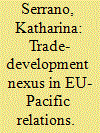| Srl | Item |
| 1 |
ID:
121437


|
|
|
|
|
| Publication |
2013.
|
| Summary/Abstract |
This article makes a methodological argument about 'studying up' in foreign policy bureaucracies. Although recent years have witnessed a growing interest in ethnography across the social sciences, including the study of foreign policy and diplomacy, theoretical reflections on the methodology as such greatly outnumber those that actually attempt ethnographic accounts of foreign policy institutions. This imbalance results in large part from the difficulty of fieldwork in these settings. Drawing on six years of research on EU external relations, including 105 interviews with foreign policy professionals, this article lays out some of the difficulties and thereby clarifies the benefits and costs of such fieldwork. More broadly, the article highlights some of the methodological challenges in interpretative research inside the institutions of foreign policy. My concern is not with ethnography or foreign policy as such; I rather examine the specific challenges of conducting fieldwork informed by ethnographic methodology inside foreign policy bureaucracies. The article advises caution about the ever-widening use of the term 'ethnography' in the study of policy.
|
|
|
|
|
|
|
|
|
|
|
|
|
|
|
|
| 2 |
ID:
126450


|
|
|
|
|
| Publication |
2013.
|
| Summary/Abstract |
The furore that greeted news that negotiations were to start on a transatlantic free trade agreement revealed not only the potential importance of any putative deal, but also the tendency of Europeans to view international politics almost uniquely in economic terms. This neglect of security and broader geostrategic issues is short-sighted and dangerous. It is precisely the liberal world order in place since the Second World War that has allowed Europeans to develop their economic potential. Leaving it to the United States to preserve that order is an increasingly problematic strategy, with the US ever more reluctant to police the world in the way it once did. The US has, for many years, asked its partners to contribute more to the preservation of common security interests. Given the failure of these attempts to date, it might be time for Washington to resort to tougher tactics in an attempt to entice Europeans out of their geostrategic retirement.
|
|
|
|
|
|
|
|
|
|
|
|
|
|
|
|
| 3 |
ID:
101833


|
|
|
|
|
| Publication |
2011.
|
| Summary/Abstract |
For almost 40 years, relations between the European Union and African, Caribbean and Pacific (ACP) countries centred on trade and development policy. The partnership survived various challenges and evolved into an institutionalised model for North-South relations. In reaction to internal and external forces of change, in the Cotonou Agreement (2000) the EU introduced to its relations with the developing world a new trade-development paradigm to be implemented via Economic Partnership Agreements. The latter are intended to be innovative foreign policy instruments, functioning as development tools and trade liberalisation mechanisms. Against the background of current internal restructuring of EU foreign policy and an increasingly politicised development agenda, this article undertakes an enquiry into the nature of the trade-development nexus in EU-Pacific Island countries (PICs) relations. The analysis is based on a theoretical framework which employs assumptions and findings related to IR theory, referring in particular to realism and dependency theory. A critical examination of EU policies shaping the trade-development nexus reveals that it is a rather flexible foreign policy tool, equipped with an auto-adjustment mechanism to ensure the balance of EU trade and development objectives. From PICs' perspective, its predictability and therefore developmental value, may, however, be diminished.
|
|
|
|
|
|
|
|
|
|
|
|
|
|
|
|